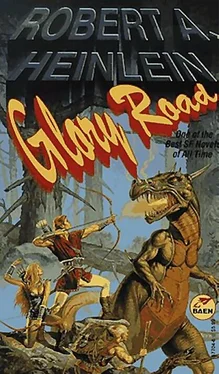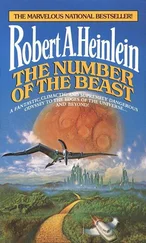Robert Heinlein - Glory Road
Здесь есть возможность читать онлайн «Robert Heinlein - Glory Road» весь текст электронной книги совершенно бесплатно (целиком полную версию без сокращений). В некоторых случаях можно слушать аудио, скачать через торрент в формате fb2 и присутствует краткое содержание. Жанр: Фантастика и фэнтези, на английском языке. Описание произведения, (предисловие) а так же отзывы посетителей доступны на портале библиотеки ЛибКат.
- Название:Glory Road
- Автор:
- Жанр:
- Год:неизвестен
- ISBN:нет данных
- Рейтинг книги:3 / 5. Голосов: 1
-
Избранное:Добавить в избранное
- Отзывы:
-
Ваша оценка:
- 60
- 1
- 2
- 3
- 4
- 5
Glory Road: краткое содержание, описание и аннотация
Предлагаем к чтению аннотацию, описание, краткое содержание или предисловие (зависит от того, что написал сам автор книги «Glory Road»). Если вы не нашли необходимую информацию о книге — напишите в комментариях, мы постараемся отыскать её.
Glory Road — читать онлайн бесплатно полную книгу (весь текст) целиком
Ниже представлен текст книги, разбитый по страницам. Система сохранения места последней прочитанной страницы, позволяет с удобством читать онлайн бесплатно книгу «Glory Road», без необходимости каждый раз заново искать на чём Вы остановились. Поставьте закладку, и сможете в любой момент перейти на страницу, на которой закончили чтение.
Интервал:
Закладка:
Robert A. Heinlein
Glory Road
BRITANNUS (shocked):
Caesar, this is not proper.
THEODOTUS (outraged):
How?
CAESAR (recovering his self-possession):
Pardon him Theodotus: he is a barbarian, and thinks that the customs of his tribe and island are the laws of nature.
Caesar and Cleopatra, Act II
George Bernard Shaw
Chapter 1
I know a place where there is no smog and no parking problem and no population explosion...no Cold War and no H-bombs and no television commercials...no Summit Conferences, no Foreign Aid, no hidden taxes—no income tax. The climate is the sort that Florida and California claim (and neither has), the land is lovely, the people are friendly and hospitable to strangers, the women are beautiful and amazingly anxious to please—
I could go back. I could—
It was an election year with the customary theme of anything you can do I can do better, to a background of beeping sputniks. I was twenty-one but couldn't figure out which party to vote against.
Instead I phoned my draft board and told them to send me that notice.
I object to conscription the way a lobster objects to boiling water: it may be his finest hour but it's not his choice. Nevertheless I love my country. Yes, I do, despite propaganda all through school about how patriotism is obsolete. One of my great-grandfathers died at Gettysburg and my father made that long walk back from Chosen Reservoir, so I didn't buy this new idea. I argued against it in class—until it got me a "D," in Social Studies, then I shut up and passed the course.
But I didn't change my opinions to match those of a teacher who didn't know Little Round Top from Seminary Ridge.
Are you of my generation? If not, do you know why we turned out so wrong-headed? Or did you just write us off as "juvenile delinquents?"
I could write a book. Brother! But I'll note one key fact: After you've spent years and years trying to knock the patriotism out of a boy, don't expect him to cheer when he gets a notice reading: GREETINGS: You are hereby ordered for induction into the Armed Forces of the United States—
Talk about a "Lost Generation!" I've read that post-World-War-One jazz—Fitzgerald and Hemingway and so on—and it strikes me that all they had to worry about was wood alcohol in bootleg liquor. They had the world by the tail—so why were they crying?
Sure, they had Hitler and the Depression ahead of them. But they didn't know that. We had Khrushchev and the H-bomb and we certainly did know.
But we were not a "Lost Generation." We were worse; we were the "Safe Generation." Not beatniks. The Beats were never more than a few hundred out of millions. Oh, we talked beatnik jive and dug cool sounds in stereo and disagreed with Playboy's poll of jazz musicians just as earnestly as if it mattered. We read Salinger and Kerouac and used language that shocked our parents and dressed (sometimes) in beatnik fashion. But we didn't think that bongo drums and a beard compared with money in the bank. We weren't rebels. We were as conformist as army worms. "Security" was our unspoken watchword.
Most of our watchwords were unspoken but we followed them as compulsively as a baby duck takes to water. "Don't fight City Hall." "Get it while the getting is good." "Don't get caught." High goals, these, great moral values, and they all mean "Security." "Going steady" (my generation's contribution to the American Dream) was based on security; it insured that Saturday night could never be the loneliest night for the weak. If you went steady, competition was eliminated.
But we had ambitions. Yes, sir! Stall off your draft board and get through college. Get married and get her pregnant, with both families helping you to stay on as a draft-immune student. Line up a job well thought of by draft boards, say with some missile firm. Better yet, take postgraduate work if your folks (or hers) could afford it and have another kid and get safely beyond the draft—besides, a doctor's degree was a union card, for promotion and pay and retirement.
Short of a pregnant wife with well-to-do parents the greatest security lay in being 4-F. Punctured eardrums were good but an allergy was best. One of my neighbors had a terrible asthma that lasted till his twenty-sixth birthday. No fake—he was allergic to draft boards. Another escape was to convince an army psychiatrist that your interests were more suited to the State Department than to the Army. More than half of my generation were "unfit for military service."
I don't find this surprising. There is an old picture of a people traveling by sleigh through deep woods—pursued by wolves. Every now and then they grab one of their number and toss him to the wolves. That's conscription even if you call it "selective service" and pretty it up with USOs and "veterans' benefits"—it's tossing a minority to the wolves while the rest go on with that single-minded pursuit of the three-car garage, the swimming pool, and the safe & secure retirement benefits.
I am not being holier-than-thou; I was after that same three-car garage myself.
However, my folks could not put me through college. My stepfather was an Air Force warrant officer with all he could handle to buy shoes for his own lads. When he was transferred to Germany just before my high school senior year and I was invited to move in with my father's sister and her husband, both of us were relieved.
I was no better off financially as my uncle-in-law was supporting a first wife—under California law much like being an Alabama field hand before the Civil War. But I had $35 a month as a "surviving dependent of a deceased veteran." (Not "war orphan," which is another deal that pays more.) My mother was certain that Dad's death had resulted from wounds but the Veterans Administration thought differently, so I was just a "surviving dependent."
$35 a month did not fill the hole I put in their groceries and it was understood that when I graduated I would root for myself. By doing my military time, no doubt—But I had my own plan; I played football and finished senior year season with the California Central Valley secondary school record for yards gained and a broken nose—and started in at the local State College the next fall with a job "sweeping the gym" at $10 more a month than that pension, plus fees.
I couldn't see the end out my plan was clear: Hang on, teeth and toenails, and get an engineering degree. Avoid the draft and marriage. On graduation get a deferred-status job. Save money and pick up a law degree, too—because, back in Homestead, Florida, a teacher had pointed out that, while engineers made money, the big money and boss jobs went to lawyers. So I was going to beat the game, yes, sir! Be a Horatio Alger hero. I would have headed straight for that law degree but for the fact that the college did not offer law.
At the end of the season my sophomore year they deemphasized football.
We had had a perfect season—no wins. "Flash" Gordon (that's me—in the sports write-ups) stood one in yardage and points; nevertheless Coach and I were out of jobs. Oh, I "swept the gym" the rest of that year on basketball, fencing, and track, but the alumnus who picked up the tab wasn't interested in a basketball player who was only six feet one. I spent that summer pushing an idiot stick and trying to line up a deal elsewhere. I turned twenty-one that summer, which chopped that $35/month, too. Shortly after Labor Day I fell back on a previously prepared position, i.e., I made that phone call to my draft board.
I had in mind a year in the Air Force, then win a competitive appointment to the Air Force Academy—be an astronaut and famous, instead of rich.
Well, we can't all be astronauts. The Air Force had its quota or something. I was in the Army so fast I hardly had time to pack.
Читать дальшеИнтервал:
Закладка:
Похожие книги на «Glory Road»
Представляем Вашему вниманию похожие книги на «Glory Road» списком для выбора. Мы отобрали схожую по названию и смыслу литературу в надежде предоставить читателям больше вариантов отыскать новые, интересные, ещё непрочитанные произведения.
Обсуждение, отзывы о книге «Glory Road» и просто собственные мнения читателей. Оставьте ваши комментарии, напишите, что Вы думаете о произведении, его смысле или главных героях. Укажите что конкретно понравилось, а что нет, и почему Вы так считаете.












